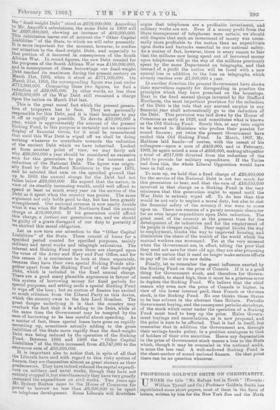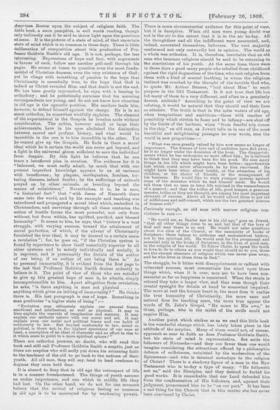PROFESSOR GOLDWIN SMITH ON CHRISTIANITY. U NDER the title "No Refuge
but in Truth" (Toronto: William Tyrroll and Co.) Professor Goldwin Smith has republished some short papers, most of them in the foram of lettere, written by him for the New York Sun and the North
Atkerieatt Review upon the subject of religious faith. The little book, a mere pamphlet, is well worth reading, though only indirectly can it be said to throw light upon the questions
at issue. It is the picture of a state of mind, of that uncertain state of mind which is so common in these days. There is little deliberation of composition about this production of Pro- fewer Goldwin Smith's old age. It is not, perhaps, the less interesting. Bxpressions of hope and fear, with arguments in favour of each, follow one another pell-mell through his
pages. He seems at times to question even the most funda- mental of Christian dogmas, even the very existence of God ;
yet he clings with something of passion to the hope that Christianity is essentially true, to the hope that God is indeed as Christ revealed Him, and that death is not the end. He has been gently reproached, he says, with a leaning to orthodoxy ; and he pathetically surmises that his accusing correspondents are young, and do not yet know how cheerless in old age is the agnostic position. His candour leads him, however, to defend himself against the charge. He is in no sense orthodox, be somewhat wistfully explains. The element of the supernatural in the Gospels he brushes aside without consideration. The critics, however small or large their achievements, have in his eyes abolished the distinction between sacred and profane history, and what would be incredible in the one is to him incredible in the other. Yet be cannot give up the Gospels. He finds in them a moral ideal which he is certain the world can never get beyond, and a light in the universal gloom sufficient to save the individual from despair. By this light he believes that he can trace a beneficent plan in creation. The evidence for it is
"balanced, we must sadly admit, by much that with our present imperfect knowledge appears to us at variance with beneficence ; by plagues, earthquakes, famines, tor-
turing diseases, infant deaths ; by the sufferings of animals preyed on by other animals, or breeding beyond the means of subsistence." Nevertheless, it is, he is sure, "a historical fact" that ." with Jesus of Nazareth there came into the world, and by his example and teaching was introduced and propagated a moral ideal which, embodied in Christendom, and surviving through all these centuries the action of hostile forces the most powerful, not only from without, but from within, has uplifted, purified, and blessed humanity." It seems to him, he says, that " history is a vast struggle, with varying success, toward the attainment of moral perfection, of which, if the advent of Christianity furnished the true ideal, it may be deemed in a certain sense a revelation"; for, he goes on, "if the Christian system is found by experience to show itself essentially superior to all other systems and to satisfy individually and socially, it is supreme, and is presumably the dictate of the author of our being, if an author of our being there is." As to personal immortality, it is evident from the first page to the last that Professor Goldwin Smith desires ardently to believe in it. The point of view of those who are satisfied to give up this greatest hope of man is, he admits, simply incomprehensible to him. Apart altogether from revelation,
he asks, "is there anything in man not physical anything which gives an inkling of immortality ? " He thinks there is. His last paragraph is one of hope. Something in man predicates "a higher state of being"
"Evolution may ultimately explain our general frame, emotional and intellectual, as well as physical. It may in time explain the marvels of imagination and memory. It may explain our testhetio nature with our music and art, It may explain even our social and political frame and our habit of conformity to law. But beyond conformity to law, social or political, is there tot, in the highest specimens of our race at least, a conception of an ideal of character and an effort to rise to it which seem to point to a more spiritual sphere ?"
There are orthodox persons, no doubt, who will read this book and still call Professor Goldwin Smith a sceptic, just as there are sceptics who will sadly put down his returning faith to the tendency of the old to go back to the notions of their youth. All old men, they will say, tend to lend credence to dogmas they once held dear.
It is absurd to deny that in old age the retrospect of life is in a manner foreshortened. The things of youth assume an undue importance, and one which in middle life they bad lost. On the other hand, we do not for one moment believe that the revival of religious feeling so common in old age is to be accounted for by weakening powers. There is some circumstantial evidence for this point of view, but it is deceptive. When old men were young doubt was not in the air to the extent that it is in the air to-day. Al).
the thoughtless and all the indifferent were accounted, and, indeed, accounted themselves, believers. The vast majority conformed not only outwardly but in opinion. The world as w whole was orthodox. It is, therefore, inevitable that an old man who becomes religious should be said to be returning to the convictions of his youth. At the same time, there were in those days a good many people who rebelled from childhood against the rigid dogmatism of the time, who cast religion from them with a kind of mental loathing, in whom the religious instinct was crushed by the thought of the terrible God who, to quote Mr. Arthur Benson, " laid about Him " to such purpose in the Old Testament. Is it not true that life has led many of them to a very different, and often to a genuinely , devout, attitude ? According to the point of view we are refuting, it would be natural that they should end their lives as atheists. The truth is that in the calm waters of old age, when temptations and ambitions—those wild reaches of possibility which stretch to fame and to infamy—are shut off by the limits of the harbour, when "from fearful trip comes in the ship," an old man, as Jowett tells us in one of the most beautiful and enlightening passages he ever wrote, sees the world in new proportions :- " What was once greatly valued by him now seems no longer of importance. The dreams of love and of ambition have fled away ; he is no longer under the dominion of the hour. The disappoint- ments which he has undergone no more affect him ; he is inclined to think that they may have been for his good. Ho sees many things in his life which might have been better ; opportunities lost which could never afterwards be by him recovered. He might have been wiser about health, or the education of his children, or his choice of friends, or the management of his business. He would like to warn younger persons against some of the mistakes which ho had himself made. Ho would toll them that no man in later life rejoiced in the-remembrance of a quarrel ; and that the trifles of life, good temper, a gracious manner, trifles as they are thought, are among the most important elements of success. Above all he would exhort them to get rid of selfishness and self-conceit, which aro the two greatest sources of human evil."
Curiously enough, an old man with narrow religious con- victions is rare :—
" He would see, as Baxter saw in his old age," goes on Jowett, "that all other things come to an end, but that of the love of God and man there is no end. He would not raise questions about the rites of the Church, or the canonicity of books of Scripture : these belong to criticism and ecclesiastical history, not to the spiritual life. He would seek for the permanent and essential only in the books of Scripture, in the lives of good men, in the religion of the world. To follow Christ, to speak tho truth in love, to do to others as you would they should do to you, these are the eternal elements of religion which can never pass away, and he who lives in these lives in God."
The struggle, he it bitter with disappointment or radiant with reiterated success, must concentrate the mind upon those things which, when it is over, men 8oe to have been non- essential so far as happiness is concerned. When the strain is relaxed they take a larger view, and that even though their mental eyesight for details at hand be somewhat impaired.
The more at rest the human heart is, the more does it realise the true humanity of Christianity, the more sane and natural does its teaching seem, time more true appear the words of St. John's Gospel, " He came to Hie own," to those, perhaps, who in the midst of the strife could not receive Him.
Another point which strikes us as we read this little book is the wonderful change which has lately taken place in the attitude of the sceptics. Many of them would not, of oourae, approach so near to faith as does Professor Goldwin Smith, but his state of mind is representative. Set aside the followers of Nietzsche—and they are fewer than one would imagine considering the attractions offered by a philosophic defence of selfishness, untainted by the moderation of the Epioureans—and who is inimical nowadays to the religion of Christ? There is a shadowy figure of a man in the New Testament who is to-day a type of many. "He followeth not ne," said the Disciples, and they desired to forbid his good works. It is remarkable that our Lord defended him from the condemnation of His followers, and, against their judgment, pronounced him to be "on our part." It has been a sad timing for the Church that in this matter she has never been convinced by Christ.











































 Previous page
Previous page